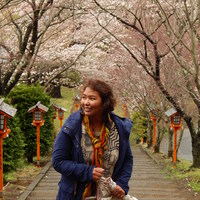chontida auikool
Thammasat University, Liberal Arts, Faculty Member
- Political Science, Southeast Asian Studies, Indonesian Studies, Diaspora and transnationalism, Chinese ethnic politics, Migration Studies, and 17 moreIndonesia, Transnational Communities, Chinese diaspora, Chinese Cities, Medan, Chinese Culture and Identity, Southeast Asian Cities, Feminist film theory, Genocide Studies, Southeast Asian history, Indonesian History, Film Studies, Islam in Indonesia, Identity politics, ASEAN, Peacebuilding, and Islam in the Southeast Asiaedit
Research Interests:
While the general literature analysing mobility patterns in Thailand’s southern border provinces largely indicates insecurity and violence as precipitating factors for migration, such explanations fail to fully explain why the majority of... more
While the general literature analysing mobility patterns in Thailand’s southern border provinces largely indicates insecurity and violence as precipitating factors for migration, such explanations fail to fully explain why the majority of those who migrate do so within the conflict area rather than away from it. Based on fieldwork, this article argues that while a lack of security measures and higher levels of violence in rural areas have induced people to migrate to more urban areas, a variety of factors, including emotional attachment to homeland, and cultural and religious considerations have influenced peoples’ decision to stay. Most importantly, the accumulation of ‘insider advantages’, enable most to adapt and seek employment despite the present circumstances.
Research Interests:
In the 19th Century, Deli-Medan received a large number of Chinese migrants. Most of them worked as labourers in Dutch agricultural plantations on the east coast of Sumatra, extending from Deli-Serdang to Medan. The agricultural products,... more
In the 19th Century, Deli-Medan received a large number of Chinese migrants. Most of them worked as labourers in Dutch agricultural plantations on the east coast of Sumatra, extending from Deli-Serdang to Medan. The agricultural products, such as tobacco, were intentionally developed and eventually became the most exported products of Sumatra. As these economic activities paved the way for economic
growth in North Sumatra, the Dutch established the city of Medan as Sumatra’s main administrative city. The research presented here is a part of larger project, Sites of Memory: The Role of Chinese and Network in Developing the Sister Cities, Georgetown Penang and Deli-Medan North Sumatra. The paper focuses on Chinese migration into the Dutch’s newly developed economic area of North Sumatra, particularly Deli-Medan.
It also provides a picture of the Chinese community, illustrating the roles of both merchants and labourers played in developing the 19th Century city.
growth in North Sumatra, the Dutch established the city of Medan as Sumatra’s main administrative city. The research presented here is a part of larger project, Sites of Memory: The Role of Chinese and Network in Developing the Sister Cities, Georgetown Penang and Deli-Medan North Sumatra. The paper focuses on Chinese migration into the Dutch’s newly developed economic area of North Sumatra, particularly Deli-Medan.
It also provides a picture of the Chinese community, illustrating the roles of both merchants and labourers played in developing the 19th Century city.
Research Interests:
Research Interests:
Research Interests:
While the general literature analysing mobility patterns in Thailand’s southern border provinces largely indicates insecurity and violence as precipitating factors for migration, such explanations fail to fully explain why the majority of... more
While the general literature analysing mobility patterns in Thailand’s southern border provinces largely indicates insecurity and violence as precipitating factors for migration, such explanations fail to fully explain why the majority of those who migrate do so within the conflict area rather than away from it. Based on fieldwork, this article argues that while a lack of security measures and higher levels of violence in rural areas have induced people to migrate to more urban areas, a variety of factors, including emotional attachment to homeland, and cultural and religious considerations have influenced peoples’ decision to stay. Most importantly, the accumulation of ‘insider advantages’, enable most to adapt and seek employment despite the present circumstances.
Research Interests:
Research Interests:
Research Interests:
Research Interests:
Research Interests:
Research Interests:
Sayang Disayang ภาพยนตร์อินโดนีเซียบอกเล่าความสัมพันธ์ระหว่างชายชาวมาเลย์สิงคโปร์ และ หญิงผู้ดูแลบ้านชาวอินโดนีเซีย วัฒนธรรมร่วมนูซันตารากำลังค่อยๆหล่อหลอมหัวใจสองดวงเป็นหนึ่งเดียว
Research Interests:
The relations between Chinese Indonesians and Indonesians are unequivocally complicated, and vary according to global & local contexts. For decades, the Chinese Indonesians and Indonesians relations have been very fragile. Ethnic tension... more
The relations between Chinese Indonesians and Indonesians are unequivocally complicated, and vary according to global & local contexts. For decades, the Chinese Indonesians and Indonesians relations have been very fragile. Ethnic tension had evidently reached its peak in 1998 and soon after that, many anti-Chinese riots took place in several cities, including Medan, the capital of North Sumatra, Indonesia. This incident has unquestionably given an indelible memory of trauma and instability to the Chinese Indonesians. In the Post-Suharto, the new regime has paved way to some degree of democratization and multiculturalism. These have given rise to ethnic freedom as well as allow the Chinese Indonesians to celebrate their culture and participate in politics through their transnational Chinese networks and Chinese organizations. The research draws on fieldwork in Medan, North Sumatra, Indonesia has found despite the end of the riot, the conflict between the Chinese Indonesians and Indonesians assuredly presents in Medan. The ethnic relations among differing groups in this particular area have not been slowly improved. The research hence critically consider on the changes of the interethnic relations between Medan Chinese-Pribumi Indonesians after 1998 and aims to describe and analyze the considerable challenges in their relations, namely history of Chinese exclusion and plural monoculturalism.
Keywords: ethnic relations, multiculturalism, plural monoculturalism, Medan, post-Suharto Indonesia
Keywords: ethnic relations, multiculturalism, plural monoculturalism, Medan, post-Suharto Indonesia
Research Interests:
Research Interests:
ภาพยนตร์สารคดีเรื่อง 03-Flats มุมมองเรื่องบ้าน ผู้หญิง ครอบครัวสิงคโปร์สมัยใหม่
Research Interests:
The tales of waria is a documentary about transgender in Indonesia
Research Interests:
Yasmine is a first commercial Brunei's movie about a girl learning Pencak Silat.
